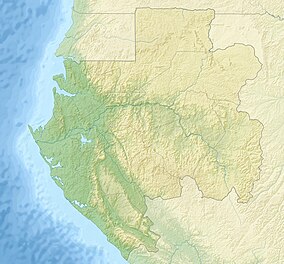Pongara National Park
| Pongara National Park | |
|---|---|
 A ranger of the National Agency for National Parks and a US Marine in the Pongara National Forest | |
| Location | Gabon |
| Coordinates | 0°07′N 9°38′E / 0.117°N 9.633°E |
| Area | 929 km² |
| Governing body | National Agency for National Parks |
| Official name | Parc National Pongara |
| Designated | 2 February 2007 |
| Reference no. | 1653[1] |
Pongara National Park (French: Parc national de Pongara) is a national park in Gabon, located near the capital, Libreville, on the south side of the Gabon Estuary and the Atlantic Ocean. Covering an area of 929km2. The national park is composed chiefly of moist tropical forests and mangrove forests.[2]
Description
[edit]Pongara National Park is situated on the southern side of the Gabon Estuary and covers an area of 96,302 hectares (371.82 sq mi). The site is predominantly forested and encompasses various habitats, including mangrove forest, swamp forest, riverine forest, and seasonally-inundated forest. Additionally, there is a long strip of sandy beach area and some grassy savanna within the park. Several rivers, such as the River Remboué, the River Igombiné, and the River Gomgoué, flow through the park and empty into the estuary[1]
Flora
[edit]The mangrove forests are dominated by Avicennia and Rhizophora species, and these and the golden leather fern (Acrostichum aureum) help stabilise the habitat and slow down water flow. People have been living here since at least the Neolithic era and gather timber, grow cassava and banana, and hunt and fish.[1]
Fauna
[edit]Elephants, gorillas, monkeys, buffaloes, duikers and chimpanzees are present in the rainforest, Hawksbill sea turtles (Eretmochelys imbricata), green sea turtles (Chelonia mydas) and olive ridley sea turtle (Lepidochelys olivacea) visit the estuary and the beaches are used by leatherback sea turtles for breeding. A local conservation organisation monitors the female leatherback turtles as they come ashore to lay their eggs, tags them, guards the nests, operates a turtle hatchery and provides ecological education for the local populace. Many migratory birds visit the estuary and up to 10,000 waders overwinter there.[1][3]
References
[edit]- ^ a b c d "Parc National Pongara". Ramsar Sites Information Service. Retrieved 25 April 2018.
- ^ mahale.web.infoseek.co.jp[permanent dead link], Retrieved on 18 June 2008
- ^ "Pongara National Park". Bradt Travel Guides. Retrieved 23 August 2019.

